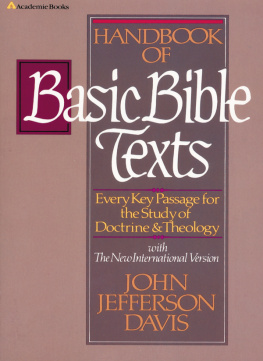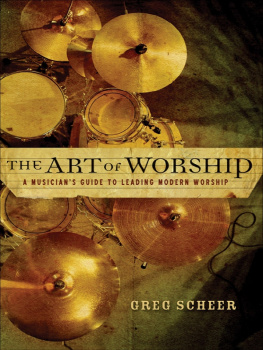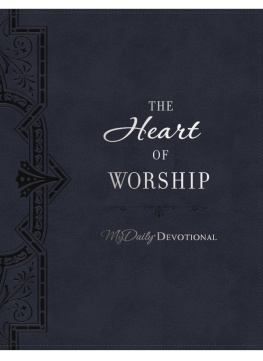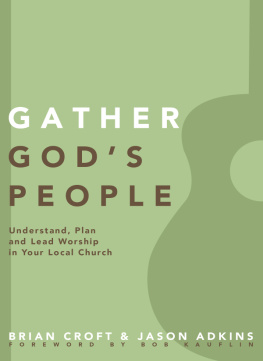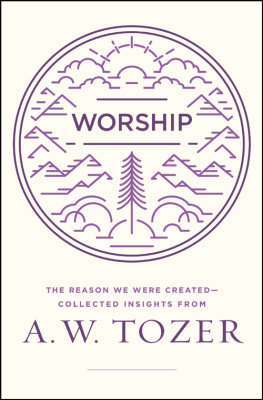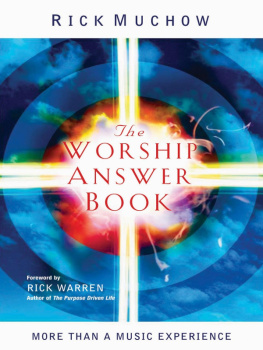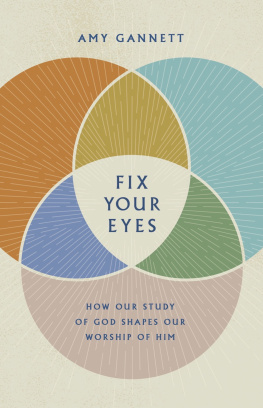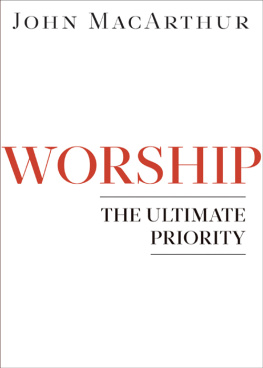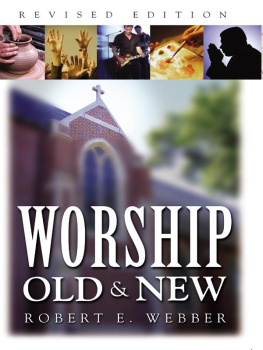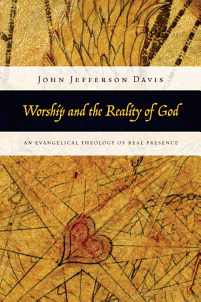If youre wondering why evangelical worship is often so thinand what can be done about ityou could hardly do better than to read this book. Professor Davis offers a cogent and deep analysis combined with arresting reflections on the nature of worship. Ill be reading it again, to be sure. Mark Galli, senior managing editor, Christianity Today
John Jefferson Davis is one of the most thoughtful persons I know. In his new book, Worship and the Reality of God, he reminds us that a follower of Jesus inhabits an alternate reality. With passion and verve, he invites readers to a deeper sense of what it means to worship God. He casts a grand vision that is Reformed in its soteriology; trinitarian in its understanding of theology; doxological in seeing worship as the highest priority of the church; charismatic in its affirmation of the gifts and presence of the Spirit in the life of the congregation; and liturgical in its ancient-modern form of worship. I dare say this vision will find resonance with all kinds of Christians, from emerging Christians to traditionalists; from the new monastics to the megachurches. Not everyone will agree with Davis at every point, but I promise you, he will make you think.
Frank A. James, provost and professor of historical theology, Gordon-Conwell Theological Seminary
Professor Davis recaptures what has been lost in most contemporary worship: a theologically rich understanding of the presence of God in our midst during congregational worship and of how we should rightly respond to this incomparable Reality. This is a book to reawaken the heart and mind to true worship, and as such, it is desperately needed.
Douglas Groothuis, Ph.D., professor of philosophy, Denver Seminary


Introduction
WHY GOD HAS BEEN LOST AND WHERE WE CAN LOOK TO FIND HIM
Scene One: My wife, Robin, and I pulled into the parking lot of the shopping center in a Denver suburb, parked the car and went inside the seeker-style community church for the Saturday night worship service. We were a few minutes early, and as we waited for the 5:30 service to begin, we noticed the message on the TV monitors in the lobby: If you find that the volume of music is too loud, ear plugs are available at the information desks in the lobby. We went inside the partially darkened auditorium for the service, sat down and watched the countdown video on the screen tick off the seconds remaining to the start of the service. As the digital clock on the screen reached zero, the praise band entered the stage and began with an ear-deafening musical set. People were standing, but many were not singing the praise choruses, their voices being drowned out by the massive electronic amplification. My wife went outside and brought back two sets of ear plugs, and with their help we made it through the worship portion of the service, which was followed by an excellent topical message on marriage. People filed out of the auditorium at the end of the service, and ushers held cardboard popcorn buckets at the doors for those who wished to leave an offering.
Scene Two: We were a few minutes late that Sunday morning for a contemporary worship service at a well-known evangelical megachurch in the Denver area, so we decided to make our way up to the second floor balcony to look for a seat. As I looked around, I noticed more coffee cups than Bibles in the hands of those who were present. I settled back in the comfortable theater-style seat, and my eyes were immediately drawn to one of the large TV monitors suspended from the ceiling to the left and the right, projecting the larger-than-life images of the praise band musicians who were live on the stage. I found myself thinking, Here I am in church, and I find my attention focused on the television screens, not on the real human beings down front. After the service we went downstairs and spent a few minutes looking around the churchs gift shop, where many who had attended the service were doing some last-minute Christmas shopping before heading home. As we left the church, I had something of an epiphany, realizing that even the church furnishingsin this case, the theater-style seatingwere sending a subliminal message, one that my culture sends continuously: Sit back, relax, and enjoy the show. When, indeed, does the churchs attempt to be culturally relevant cross the line and become entertainment, or, so to speak, worshedutainment? Those questions continue to haunt me.
Those services were only two of the thirty-five different church services that my wife and I attended that fall in the greater Denver area. When we are at home, we are not church hoppers, but since I am a seminary professor, training future pastors and teachers, when I am away for a research sabbatical, as was the case that fall, we try to visit as many churches as possible to see how theological education is being played out at the retail outlets. These thirty-five worship services ran the entire gamut from very traditional to very contemporary, from the very quiet to the very loud, from the very large to the very small. In terms of denominational traditions, these churches included Quaker, Pentecostal, charismatic, Presbyterian, Lutheran, Nazarene, Congregational, Episcopal, Anglican, Roman Catholic, Greek Orthodox, Russian Orthodox, Antiochian Orthodox, Coptic Orthodox, independent and nondenominational, several varieties of emerging churches, and several seeker churches, including Willow Creek Community Church in South Barrington, Illinois.
As my wife Robin and I struggled to process the tremendous diversity and variety in worship styles that we had experienced, we realized that at the heart of it all was a strange and paradoxical situation. In most of the evangelical churches with contemporary worship styles, the expository or topical preaching was often excellent, and the praise bands were generally performing at very professional levels, but we still were left with disturbing questions:
Where is God in all this?
What are we really doing here?
Is there a vivid consciousness of the presence of the living, holy God, among his people at these services?
As I pondered those questions, I somewhat reluctantly concluded that in most of these services a vivid awareness of Gods presence as the central reality in worship was indeed missing. Along with this I had a sinking feeling as I asked myself a further question: If indeed a consciousness of the presence of a holy and living God as the dominant reality on Sunday morning has been lost in many evangelical churches,1 whose fault is that? Who is to blame? The culture? Hollywood? Megachurch pastors? TV evangelists? Such blame-shifting answers were too easy; in the pit of my stomach I sensed something of a spiritual wakeup call as I realized that evangelical seminary professors like myselfand especially the theologiansneeded to look in the mirror and assume a heavy share of responsibility for the current realities (or unrealities) in American evangelical worship. I began to see that the strengths and the weaknesses of the contemporary evangelical churches and their worship services tended to reflect the strengths and weaknesses of the curricula of the evangelical seminaries where these pastors had been trained. Where seminaries such as Gordon-Conwell and Denver Seminary are strong and place great emphasisBible, sound doctrine, expository preachingthe graduates tended to do well; my wife and I do not recall any obvious instances of faulty doctrine from the pulpit, and the preaching was generally good. In areas such as


